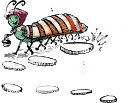Toys that engage imagination and inventiveness
“Suddenly it becomes important to decide what is a toy?
It is a substitute for which there is no substitute.
It exists for its own sake yet it should be somehow unfinished.
It shouldn’t be designed to teach, yet it should help you learn.”
From a book entitled ‘Japanese Folk Toys, The Playful Arts’
Toys are central to The Toy Maker’s Cottage philosophy, but not just any toys. We believe toys should be vehicles for the imagination, as well as tools that help children to understand the world. Unfortunately too many modern toys don’t encourage invention and discovery, which is why we look to the 18th and 19th centuries for many of our toys.
The toys in use at The Toy Maker’s Cottage have been sourced from toy makers around New Zealand and the world. Many of these people work out of their garden sheds and homes, just like the toy makers of old. They have beautiful stories and lives.
In all cases, our toys are safe to use and made from sustainable materials. Each one has a story to tell about their making and their maker.
Heirloom toys
Through heirloom toys children learn to love and respect things that aren’t brand new. They develop an appreciation of the past and discover how to care for and fix things. Heirloom toys never go out of style and help to counteract the ‘disposable’ messaging that pervades the world.
Heirloom toys are the toys that our parents and grandparents played with – everything from building blocks to rocking horses. They stand the test of time and can be repaired easily when they break. We only use toys that meet today’s safety standards.
Loose part toys
In our preschool, loose parts are materials that can be moved, carried, combined, redesigned, lined up, taken apart and put back together in many ways. They are materials with no specific set of directions that can be used alone or combined with other materials.
Loose part play is important for children’s brain development, confidence and imagination. They learn to invent, solve problems and achieve.
Children making their own toys
Children have always made toys for themselves. In doing so, they learn to better understand the physical environment in which they live. As the Swiss psychologist Jean Piaget explains: “The essential functions of intelligence consist in understanding and inventing, in other words in building up structures by structuring reality.”
Making toys together is an opportunity for adults and children to collaborate in the processes of creation, invention and discovery.
Toys that help children to understand science
Toys can provide links between science concepts and everyday experiences. Our teachers guide their young students toward exploring and understanding these connections through fun, hands-on activities using hand-made and heirloom toys or common household objects.
“Often the most exciting toys are those that are based on a scientific principle. A spinning top demonstrates the idea of centrifugal force, and a picture flip-book demonstrates the phenomenon of the persistence of vision, which makes possible motion-picture films.”
From the book ‘Easy-to-make Old Fashioned Toys’ by Eugene F. Provenzo, Jr. and Asterie Baker Provenzo
